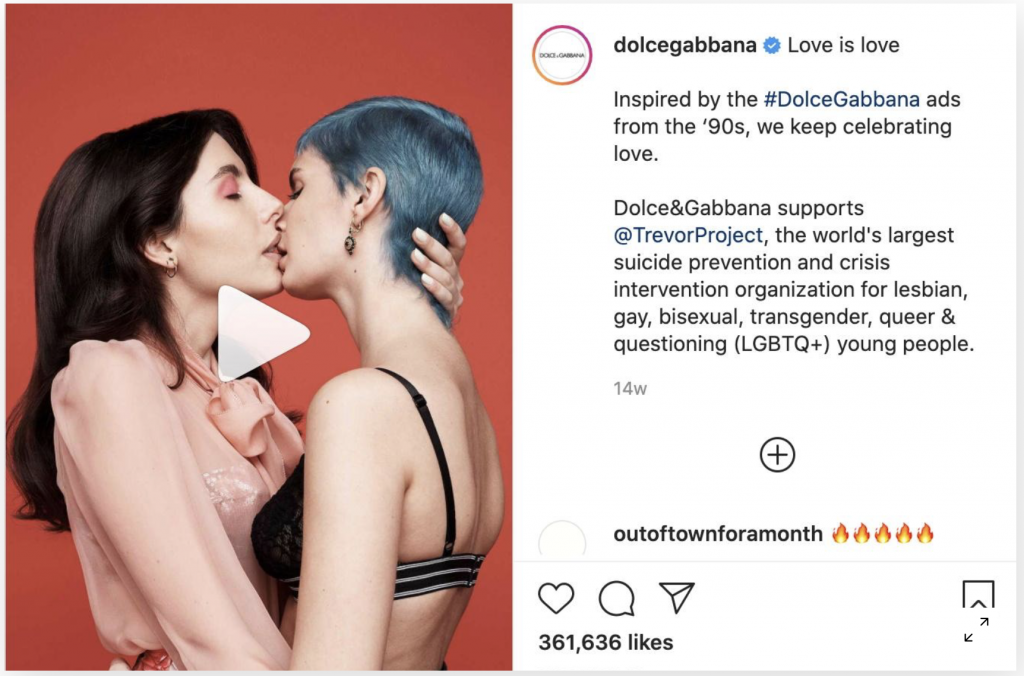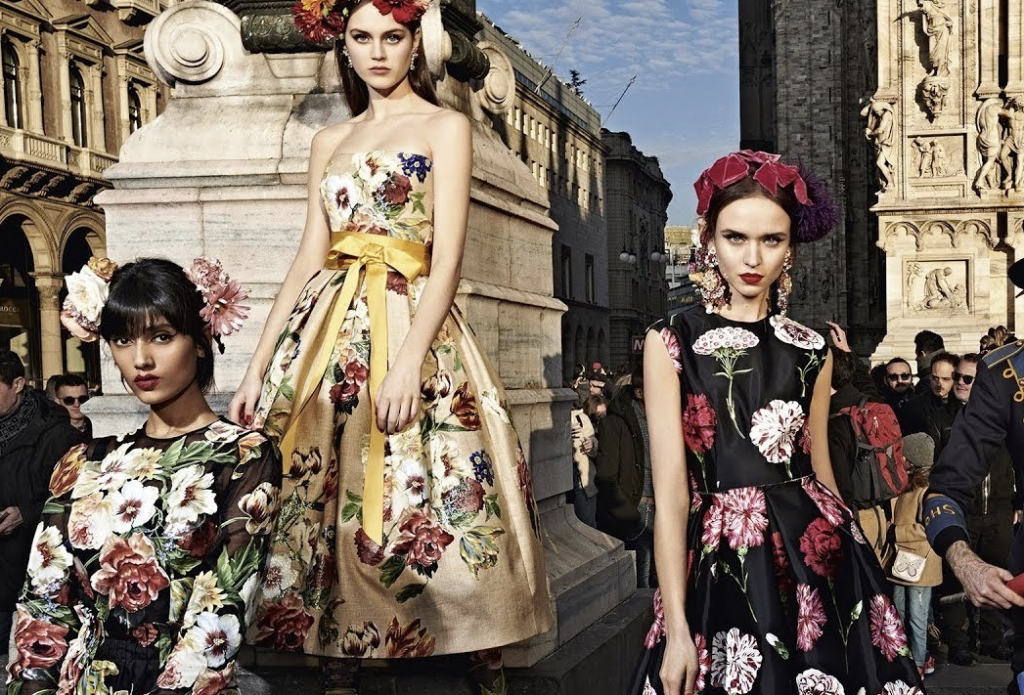An 8-year-old Russian law that makes it illegal to “spread propaganda on non-traditional sexual relations” is making headlines in connection with an ad campaign from Dolce & Gabbana. A Russian prosecutor called for the Dolce & Gabbana “Love is Love” ads – which were posted on Instagram ahead of Valentine’s Day this year – be banned in Russia, as they “show same-sex couples kissing,” according to a statement from the St. Petersburg courts’ press service on Monday. As first reported by Reuters, Russian politician Mikhail Romanov filed a formal complaint this week, alleging that the ads from the Italian fashion house “contain information that rejects family values and propagandizes non-traditional sexual relationships.”
The budding Russian advertising case has already hit a potential snag, per Reuters, as “the prosecutor’s claim … has not fulfilled certain administrative requirements, including providing documents supporting the claim,” but is expected to be updated early next month. While same-sex marriage was decriminalized in Russia 1993, on the heels of a 2020 vote, President Vladimir Putin formalized constitutional changes this spring, which in addition to “emphasizing the primacy of Russian law over international norms, [and] mentioning ‘a belief in God, as a core value,” also outlaws same-sex marriages.
The constitutional amendments come years after Russia adopted a law against the depiction of “non-traditional sexual relations,” which has been in effect since 2013 as part of an effort by Putin to purse what international media called “an increasingly conservative social agenda.” Despite facing pushback from human rights organizations, such as Human Rights Watch, as well as individuals like Norwegian Ambassador Robert Kvile and German politician Markus Löning, on the basis that it is an attack on the LGBT population, the controversial bill was passed by Russia’s upper house in a 436-0 vote in June 2013 and subsequently signed into law by Putin, a move that served to nationalize similar local laws already in place in Russian cities, such as St. Petersburg.

Speaking at the time about claims that gay citizens in Russia were being persecuted, Putin told reporters that “homosexuals are equal citizens enjoying full rights” in Russia, noting that the law, is “not about imposing some sort of sanctions on homosexuality, [but] about protecting children from such information.”
In terms of the ramifications should parties violate the ban on the publication of such “propaganda,” including by way of the press, television radio and/or internet, the law carries with it monetary penalties and the potential for imprisonment. For companies, the fine for breaching the anti-propaganda law could reach up to 500,000 rubles ($6,803), with individuals being subject to smaller amounts. And alleged breaches of the law have not gone unpoliced. Human Rights Watch asserts that the law has been used to “shut down websites that provide valuable information and services to teens across Russia and to bar LGBT support groups from working with youth.” Beyond that, the organization reports that “individual mental health professionals have curtailed what they say and what support they give to students, while the law gives the strong imprimatur of the Russian state to the false and discriminatory view that LGBT people are a threat to tradition and the family.”
As recently as in July 2020, a Russian woman was charged with violating the law by spreading “gay propaganda” among minors by publishing drawings of same-sex couples with children online, and fined 75,000 rubles ($1,000) as a result. Reuters characterized 28-year old Yulia Tsvetkova’s law-breaking drawings as “colorful pictures, some showing two men or two women, holding babies or standing with young children, sometimes surrounded by rainbow-colored love hearts.”
Representatives for the Dolce & Gabbana brand, which was founded in 1985 by gay designers Domenico Dolce and Stefano Gabbana, declined to comment on the case. No strangers to controversy, Dolce & Gabbana famously came under fire in 2018 after it launched video ads featuring a Chinese woman struggling to eat pizza and other Italian food with chopsticks ahead of the brand’s scheduled runway show in Shanghai. The brand “abruptly canceled the fashion show,” the New York Times revealed at the time (while other outlets reported that the Chinese government pulled the plug on the over-the-top fashion show), as the situation escalated when offensive comments that were sent from co-founder Stefano Gabbana’s personal Instagram account began to surface online, including on the China-specific social media site, Weibo, as Western social media sites are blocked on the mainland.
In the wake of the cancelled show and still-mounting consumer fury, big-name e-commerce retailers began dropping the Italian design brand from their lists of stocked brands, and celebrities across the globe distances themselves from the brand. The consumer backlash against Dolce & Gabbana has faded, and celebrities are once again appearing in Dolce & Gabbana looks on red carpets, and all the while, retailers have taken to enlisting the brand’s offerings once again. Nonetheless, Dolce & Gabbana is still in the midst of a legal battle with Instagram call-out account Diet Prada, whose founders are being sued by the brand for defamation for allegedly initiating a “smear campaign” consisting of “serious and repeated defamatory conduct” aimed at damaging the Italian brand, and costing it 3 million euro ($3.7 million) in damages.











